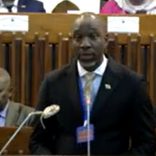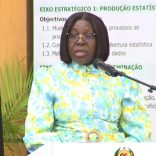Mozambican judges push for salary reform
CIP calls for release of full Kroll audit report – AIM

The Mozambican anti-corruption NGO, the Centre for Public Integrity (CIP), has called on the Attorney-General’s Office (PGR), to release the full report from the audit of the three security-related companies, Ematum (Mozambique Tuna Company), Proindicus and MAM (Mozambique Asset Management).
These companies took over two billion dollars in loans from European banks in 2013 and 2014, which were illegally guaranteed by the Mozambican government of the time, headed by President Armando Guebuza.
The audit was undertaken by the London branch of the US company, Kroll Associates, and the repot was delivered to the PGR in May. But to date only the executive summary of the Kroll report has appeared on the PGR website.
However, the full report is circulating among restricted circles. The main donors to the Mozambican state, for example, are known to have received copies. And CIP itself has obtained a copy.
A CIP press release, received by AIM on Thursday, says that the full report is 249 pages long, and presents a series of recommendations that Kroll believes the PGR should follow.
CIP accuses the PGR of hiding the full report from the public. However, when the summary was released, on 23 June, the promise made was that the full report would be available three months later. The PGR is still within that deadline.
CIP says that it could have opted to publish the full report itself – but has not done so because it believes “this would not be the best way of cooperating with the body charged with the investigation. The PGR itself should share the report with the Mozambican public, who are those most injured by the greatest corruption scandal since Mozambican independence”.
But CIP does publish some of Kroll’s main recommendations. One is that Credit Suisse should be investigated for its failure to exercise due diligence over the Mozambican companies when they came looking for loans. The London branch of Credit Suisse was the main bank involved in the loans of 850 million dollars to Ematum and 622 million to Proindicus.
Kroll believes that Credit Suisse may have broken British law, and so proposes that the PGR approach the British authorities asking them to “request the details of enhanced due diligence documentation from Credit Suisse”.
Kroll also noted that Ematum, Proindicus and MAM had also failed to show that any appropriate due diligence had been undertaken before selecting the Lebanon-based group Privinvest as the contractor, that provided the companies with the equipment paid for out of the loans. The danger of failing to undertake due diligence was that the companies might have ended up signing contracts that were not to Mozambique’s advantage.
So Kroll recommends that the PGR request the State Intelligence and Security Service (SISE) provide all documents referring to how the contractor was hired, which might show whether any criminal practices were involved.
The executive summary of the report had already pointed to inconsistencies about the use of 500 million dollars of the Ematum loan. This sum was incorporated into the state budget, supposedly to pay for maritime security equipment. But Kroll could find no sign of any such military equipment.
The Ministry of Economy and Finance, the Ministry of Defence and “Person A” – known to be the SISE officer Antonio do Rosario, who is the chairperson of all three companies – gave Kroll contradictory accounts of whether the money was indeed spent for military purposes. Rosario said it had been, but neither of the ministries would confirm this, and Privinvest categorically denied that it provided any weaponry.
Kroll suspects that some or all of this 500 million dollars may have been used for improper purposes, outside the scope of the contracts signed between the companies and Privinvest. It proposes that the PGR question Rosario and relevant staff of the Finance Ministry who might shed some light on how this money was spent.
Kroll suspected over-invoicing to the tune of 713 million dollars. This was based on comparing the value of the assets as stated on invoices, and an independent valuation. To ascertain whether or not there was any over-invoicing, Kroll suggests that the PGR investigates the three supply contracts using a clause in Arbitration Law in Switzerland. This would require the PGR contacting the Swiss Financial Market Supervisory Authority.
CIP warns that, if the PGR keeps the full report secret, sharing it with only a few selected bodies, it is denying to the Mozambican public its right to information.
It points out that the PGR has already shown weakness during the audit, in allowing the companies to withhold information from the Kroll auditors. In the executive summary, Kroll admits that the audit is incomplete, precisely because the companies refused to hand over all the information requested.
This refusal was a deliberate attempt to sabotage the audit, and Rosario boasted, in a message widely circulated on social media, that he had thrown the auditors out of his office.













Leave a Reply
Be the First to Comment!
You must be logged in to post a comment.
You must be logged in to post a comment.